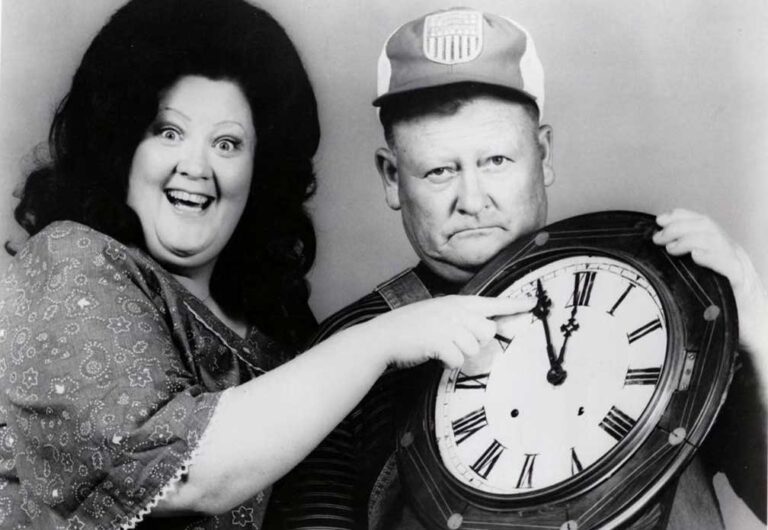In the 1970s, Northern New England was a virtual country music desert. I should know; I lived there at the time. Sure, we had a somewhat obligatory AM country radio station, but listeners were few and the quality of the broadcast was suspect.
News from the country music world was even more limited.
Few, if any, country stars graced the stage of the local arena until about 1980, when one or two country artists each year would make their pass through the northern tier of states. Record stores had a limited number of country albums, so it was difficult to place a singer’s face with the voice you heard on the radio.
Thank goodness for “Hee Haw.”
The one saving grace a country music fan had in that area and era was the original CBS country variety show — “Hee Haw.” Yes, every Saturday night at 7 p.m., “Hee Haw” appeared on local television; continued even after CBS dropped the show and it went into syndication.
One of the show’s attractions — at least to the teenage and adult male segment of the audience — was its country women. While they were virtually nameless, most of the women on “Hee Haw” were Southern beauties with sharp tongues and country wit.
Then there was Lulu Roman.
Buck Owens, who co-hosted “Hee Haw” along with Roy Clark, often told of Lulu Roman’s casting into the series.
The producers told Owens they were looking for the following characters: “A gorgeous blonde. A gorgeous brunette. A boy next-door type. A girl next-door type. A fat, dumb man — and a fat, dumb woman.”
Owens, who knew of the Dallas entertainment scene, didn’t hesitate to recommend someone for the role of the fat lady.
“I’ve got just the woman for you, and she lives in Dallas,” he said. So was the break of Lulu Roman’s career. (Incidentally, the “fat, dumb man” they cast was none other than the beloved Junior Sample, best known for his catchphrase phone number: “BR 549.”)
Who was Lulu Roman?
In 1946, the child who would become Lulu Roman was born in a maternity ward for unwed mothers in Dallas. Her given name was Bertha Louise Hable. After her mother took off, the infant was sent to live with her great-grandmother. This arrangement lasted until little Bertha was 4 years old and her caretaker could no longer handle her.
For the second time in her short life, Bertha was abandoned, this time left in a Dallas orphanage. This would be her home for the next 14 years, until she turned 18.
Even as a young child, Bertha was obese. She later learned that she had a thyroid condition, which eventually led to the biggest problem with her health — and life in the orphanage didn’t help control her weight.
Young Bertha was relentlessly teased and bullied by the other kids. They even named the orphanage school bus “Big Bertha” as an affront to her. In later years, Lulu Roman recalled that she cried herself to sleep most nights and turned to eating to deal with an already difficult problem.
She was especially fond of sugar … and her weight gain showed it. She also turned to drugs in an effort to lift the constant depression. Methamphetamines, marijuana, and LSD were personal favorites.
“I was a proverbial hippy, into the drug scene,” she later shared. She attempted to take her own life on more than one occasion.
Lulu followed a rocky road to success.
Bertha Hable’s stage name, “Lulu Roman,” provides interesting insight into her life.
“Lulu,” an outtake on her middle name, was a nickname Bertha was given by a woman she met in jail during one of several “visits” because of her drug problem. The cellmate who gave her the name was in jail on charges of first-degree murder.
“Roman,” Lulu’s adopted last name, was one she took from her husband. It was a marriage that literally lasted only a few minutes.
According to Lulu, she was offered $1,500 to marry a Filipino immigrant. Following the marriage, as the couple left the courthouse, she was informed by her new husband that he was not going to pay what he owed. She immediately grabbed him by the ear, led him back to the judge, and had the marriage annulled on the spot.
Even so, she kept the last name “Roman” for the rest of her life despite two additional marriages.
In 1964, after graduating W.W. Samuel High School in Dallas, she went to work as a dancer. She was billed as “The World’s Biggest Go-Go Dancer” and worked shows in Dallas nightclubs owned by Jack Ruby (yes, the Jack Ruby of Lee Harvey Oswald fame).
It was through her nightclub act that Buck Owens became familiar with Lulu. He offered her a job on “Hee Haw” with promises of fame and money. The next thing Lulu knew she was on a plane bound for Hollywood to audition and meet with the show’s producers.
The first person she met was Carol Burnett who told Lulu she would soon be a star.
Lulu Roman quickly became a fan favorite on Hee Haw.
Her sharp sass, self-deprecating humor and ability to relate to the rest of the cast in any of the many skits in which she appeared became legendary.
But Lulu’s past was about to catch up with her.
In 1971, producers dismissed Lulu from the show after two arrests for drug use and an unwed pregnancy. The producers couldn’t allow such a scandal to interfere with what they billed as a “family” television show.
The 350-pound performer took her release to heart. Over the next year, she found Christianity — as well as sobriety. Her transformation was so impressive that “Hee Haw” called her back to the set in 1973.
She remained a regular on the show for the next two decades, the entirety of its run.
Underneath it all, Lulu nurtured a hidden talent.
During her time away from television, Lulu discovered a talent she had never realized she possessed — singing.
She so impressed the producers of “Hee Haw” with her distinctive Southern gospel voice that they made her into a vocalist on the show in addition to her role as a comedienne.
Over the years, Lulu went on to record 19 albums, including one with longtime friend Dolly Parton. In 1985 she earned a Dove Award in 1985 (gospel’s version of the CMA award), and in 1999 she was inducted into the Southern Gospel Music Hall of Fame.
Lulu’s life changed considerably after ‘Hee Haw.’
After her long run with “Hee Haw” ended with the show’s cancellation in 1993, Lulu continued singing and recording, making appearances at many fairs around the country as well as in prisons.
By the early 2000s, her weight had reached over 400 pounds — and Lulu decided it was time to act. She had bariatric surgery and lost 200 pounds, dropping her from Size 53 to Size 14.
She was no longer the “fat, dumb woman” who debuted on “Hee Haw” more than 30 years earlier.
With newfound strength but the same solid voice, Lulu continued touring.
On April 23, 2025, Lulu Roman passed away at her home in Washington state, reportedly of heart failure. It seems her hard lifestyle and virtual lifetime of obesity finally caught up with her.
However, she’ll continue to live on; episodes of “Hee Haw” are still shown today on outlets like YouTube and streaming television services.
Until next time, “heeeee-haw!”
Since retiring from a career as an outdoor recreation professional from the State of Arkansas, Kris Rutherford has worked as a freelance writer and, with his wife, owns and publishes a small Northeast Texas newspaper, The Roxton Progress. Kris has worked as a ghostwriter and editor and has authored seven books of his own. He became interested in the trucking industry as a child in the 1970s when his family traveled the interstates twice a year between their home in Maine and their native Texas. He has been a classic country music enthusiast since the age of nine when he developed a special interest in trucking songs.










